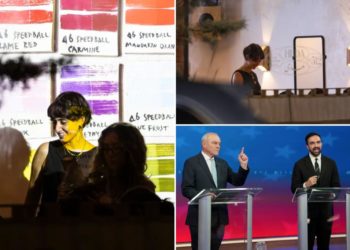BRUSSELS — Montenegro wants the EU’s help in fighting Russian disinformation as the Balkan nation moves toward membership of the bloc.
The small country, which has set an ambitious goal to join the EU by 2028, is increasingly a target for disinformation from those hoping to disrupt its membership bid, Montenegrin President Jakov Milatović told POLITICO in an exclusive interview in Brussels.
“I’m very much hoping that in the future we would be getting bigger support from the EU to really fight disinformation and misinformation,” Milatović said, adding he had pitched the idea to EU policymakers and member countries.
Moldova, another EU candidate country, has been a favorite target of the Kremlin’s meddling, including vote-buying and disinformation. That led the EU to deploy last month its new cyber reserve — a team of private-sector cybersecurity experts — to Chişinǎu and allocate millions in funding for a hub to fight disinformation.
Milatović, who was in Brussels to meet with European Council President António Costa, said “malign influence from third countries” could pose a risk to Montenegro’s accession, and urged the EU to be proactive in countering such threats.
“Sometimes, I feel that pro-European politicians in the region of the Western Balkans are a bit left alone by the partners in the EU,” he said, adding that he encountered disinformation “on a daily basis.”
‘End of the race’
Montenegro applied to join the EU in 2008 and was granted candidate status in 2010. It has closed seven of 33 accession chapters since then and is on track to close five more by December, a senior Montenegrin diplomat confirmed to POLITICO.
With a population of 600,000, the tiny Adriatic nation has sought to position itself as the obvious next member of the 27-nation bloc. But it faces potential obstacles, including pro-Serb parties in its parliament, tensions with neighboring Croatia and skepticism in some corners of the EU about enlargement. Tellingly, the issue is not even on the agenda of next week’s European Council summit.
French President Emmanuel Macron called in 2023 for the EU to reform itself before letting in new members. But Milatović said that behind closed doors, Macron had come around to the idea of Montenegro’s membership.
“I believe that two years ago, before President Macron started speaking with me, he had … one opinion,” Milatović said. “After so many discussions that I had with him,” however, Macron was now “optimistic … about Montenegro’s position in the EU.”
“And I believe this is the case also with all the other EU leaders,” Milatović added. “Montenegro is now perceived as a front-runner. But … I do want to see the end of the race, in a sense.”
Another potential sticking point is the country’s reliance on Russian tourists and investors. Montenegro has yet to introduce visas for Russians, who can enter the country visa-free for 30 days, and Russians remain the largest foreign investors.
“What we are trying to do is sort of postpone it [visas] as much as we can, so that we still keep our tourism sector alive,” Milatović said, adding he was “absolutely” concerned by the influx of Russian cash. “We are a bit in a vacuum now because … we don’t have full access to EU funds.” That said, Montenegro will align its visa regime with the EU “very soon,” he said.
Ultimately, while much of the onus is on Podgorica to unite its political forces and deliver promised reforms, the EU also needs to prove “enlargement is alive” and “reforms pay off,” Milatović warned.
“The last country that entered was Croatia more than 10 years ago. And in the meantime, the United Kingdom left,” Milatović said. “So this is why I believe that now is the time to revive the process, to also revive a bit the idea of the EU as a club that still has a gravity toward it.”
The post Montenegro asks EU for help fighting Russian meddling appeared first on Politico.




